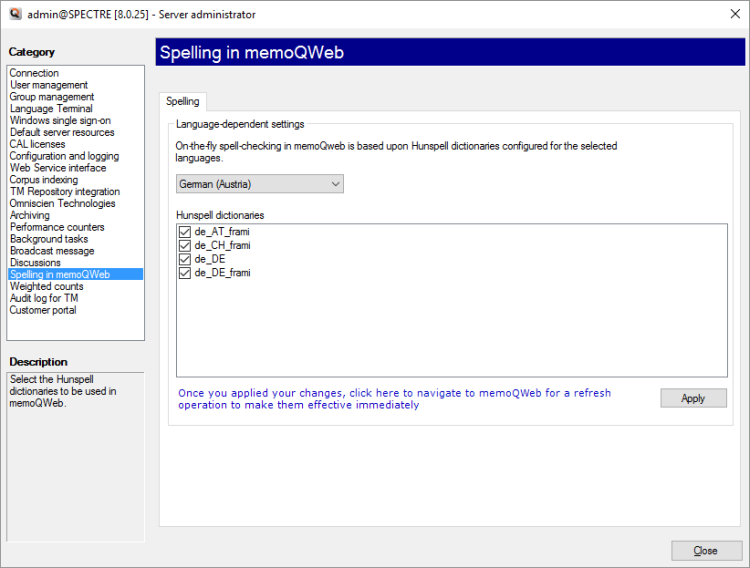Server Administrator - Spelling in memoQweb
On the Spelling in memoQweb pane, you can check and choose spelling dictionaries for each target language. memoQ TMS uses these spelling dictionaries for spell checking in memoQweb.
You cannot install new spelling dictionaries here, but you can choose which ones memoQ TMS should use for each language.
You need the project manager edition of memoQ to manage a memoQ TMS.
You can manage the server only if you are a member of the Project managers or Administrators group in the memoQ TMS. To change most settings, you must be a member of the Administrators group.
How to get here
-
At the very top of the memoQ window, click the Server Administrator
 icon. You can also find this icon on the Project ribbon.
icon. You can also find this icon on the Project ribbon. -
The Server Administrator window opens, showing the Connection pane.
-
Type or choose the address of the memoQ TMS, and click the Select
 button.
button.You may need to log in: If you access this server for the first time, the Log in to server window opens. You need a user name and a password to access the server.
- Under Category, click Spelling in memoQweb. The Spelling in memoQweb pane appears.

What can you do?
Check spelling dictionaries for a language: In the drop-down box at the top, choose a language. You can choose main languages as well as sublanguages.
For a main language, there can be several spelling dictionaries. You can choose which ones to use for the main language and for the sublanguages. (memoQ displays all dictionaries for sublanguages, too.)
For example, German (Austria) has all the German dictionaries turned on. However, you may want to use the Austrian dictionary (de_AT_frami) only, so you clear all other checkboxes.
For English the main language, only the US (en_US) dictionary is used.
You can choose this for the languages where the dictionary is installed with memoQ TMS.
To save your changes, click Apply.
Languages that have their dictionary installed:
|
Dictionary |
Language |
|
cs_CZ |
Czech |
|
da_DK |
Danish |
|
nl_NL |
Dutch |
|
en_AU |
English (Australia) |
|
en_CA |
English (Canada) |
|
en_GB |
English (United Kingdom) |
|
en_US |
English (United States) |
|
fi_FI |
Finnish |
|
fr_FR_1-3-2 |
French (France) |
|
fr_FR-1990_1-3-2 |
French (France) |
|
de_AT_frami |
German (Austria) |
|
de_DE |
German (Germany) |
|
de_DE_frami |
German (Germany) |
|
de_CH_frami |
German (Switzerland) |
|
el_GR |
Greek |
|
he_IL |
Hebrew |
|
hu_HU |
Hungarian |
|
hu_HU_comb |
Hungarian |
|
it_IT |
Italian |
|
pl_PL |
Polish (Poland) |
|
pt_BR |
Portuguese (Brazil) |
|
pt_PT |
Portuguese (Portugal) |
|
ro_RO |
Romanian |
|
ru_RU |
Russian |
|
sk_SK |
Slovak |
|
es_MX |
Spanish (Mexico) |
|
es_ES |
Spanish (Spain) |
|
sv_SE |
Swedish |
When you finish
To return to memoQ: Click Close.
Or, choose another category to manage:
- Connection (choose this to manage a different server)
- User management
- Server connections
- Group management
- Windows single sign-on
- Default server resources
- CAL licenses
- ELM licenses
- Configuration and logging
- Web service interface
- Corpus indexing
- Omniscien Technologies
- Archiving
- Performance counters
- Storage
- Background tasks
- Broadcast message
- Discussions
- Spelling in memoQweb
- Weighted counts
- Audit log for TMs
- customer portal
- CMS connections